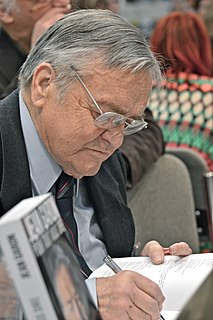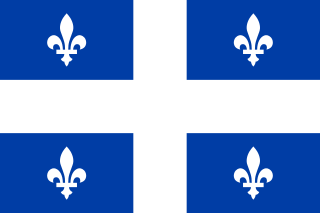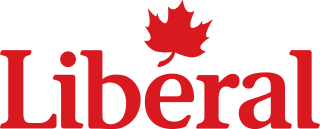
The Montreal City Council is the governing body in the mayor–council government in the city of Montreal, Quebec. The head of the city government in Montreal is the mayor, who is first among equals in the city council. The council is a democratically elected institution and is the final decision-making authority in the city, although much power is centralized in the executive committee. The council consists of 65 members from all boroughs of the city. The council has jurisdiction over many matters, including public security, agreements with other governments, subsidy programs, the environment, urban planning, and a three-year capital expenditure program. The city council is also required to supervise, standardize or approve certain decisions made by the borough councils.

Jean Garon was a politician, lawyer, academic and economist in Quebec, Canada.
The Civic Party of Montreal was a municipal political party in Montreal, Quebec, Canada. It existed from 1960 to 1994. Throughout its history the Civic Party was dominated by the personality of its leader Jean Drapeau.
Municipal elections took place throughout Quebec, Canada, on November 1, 2009, to replace mayors and councillors.
Several municipalities in the Canadian province of Quebec held municipal elections to elect mayors and councillors on November 2, 1997. The most closely watched contest was in Quebec City, where incumbent mayor Jean-Paul L'Allier was re-elected, although his supporters lost control of city council to the Civic Progress Party.
Eight hundred and thirty-one municipalities in the Canadian province of Quebec held municipal elections to elect mayors and councillors on November 7, 1993. Incumbent mayor Jean-Paul L'Allier was re-elected in Quebec City and his Rassemblement Populaire party won sixteen out of twenty council seats.
The Montreal Executive Committee is the executive branch of the municipal government of Montreal, Quebec, Canada. The committee reports directly to city hall and is responsible for generating documents such as budgets and by-laws, which are then sent to the Montreal City Council for approval. As of 2017, the committee consists of the mayor of Montreal, twelve members, and five associate members.
Lyn Thériault, formerly known as Lyn Faust, is a politician in Montreal, Quebec, Canada. She has served on the Montreal city council since 2001 as a member of the Vision Montreal party. She was also an elected member of the Commission scolaire de Montréal from 1998 to 2007.
The Coalition démocratique de Montréal was a left-of-centre municipal political party that existed in Montreal, Quebec, Canada from 1989 to 2001.
The Verdun borough council is the local governing body of Verdun, a borough in the City of Montreal. The council consists of seven members: the borough mayor, two city councillors representing the borough's electoral districts, and four borough councillors representing of the same electoral districts.
Ginette Marotte is politician in Montreal, Quebec, Canada. She served on the Montreal city council from 2005 to 2013 and was mayor of the Verdun borough council from 2012 to 2013.
Équipe Andrée Champoux pour Verdun (EAC) was a municipal political party in Montreal, Quebec, Canada. The party contested seats on the Verdun borough council in the 2013 Montreal municipal election.
Option Verdun/Montréal (OVM) was a municipal political party in Montreal, Quebec, Canada. The party contested seats on the Verdun borough council in the 2013 Montreal municipal election.
Jean-François Parenteau is a politician in Montreal, Quebec, Canada. He was elected as borough mayor of Verdun in 2013 and, by virtue of holding this position, is a member of both the Montreal city council and the Verdun borough council. He currently sits as an independent and is a member of the Montreal Executive Committee.
Alain Tassé is a politician in Montreal, Quebec, Canada. He served on the Montreal city council from 2005 to 2013, initially as a member of the Montreal Island Citizens Union (MICU)/Union Montreal (UM) party and later as an independent. From 2012 to 2013, he was a member of the Montreal executive committee. At an earlier time in his life, he held a leading position in the New Democratic Party in Quebec and was a candidate for the House of Commons of Canada.
Several municipalities in the Canadian province of Quebec held municipal elections to elect mayors and councillors on November 3, 1985.

Municipal elections were held in the city of Montreal, Quebec, Canada on November 5, 2017 as part of the 2017 Quebec municipal elections. Voters elected 65 positions on the Montreal City Council, including the mayor, borough mayors, and city councillors, as well as 38 borough councillors.
Georges Bossé is a retired politician in the Canadian province of Quebec. He was the mayor of Verdun from 1993 until its amalgamation into the city of Montreal in 2001 and subsequently served as a Montreal city councillor and member of the Montreal executive committee.
Laurent Dugas is a former politician in the Canadian province of Quebec. He was a Verdun city councillor from 1985 to 2001 and a Montreal city councillor from 2002 to 2004, following Verdun's amalgamation into Montreal. His career in public life ended following a personal scandal.






